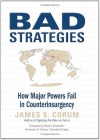Bad Strategies: How Major Powers Fail in Counterinsurgency
Written by: James S Corum,
Zenith Press, Minneapolis, 2008,
ISBN: 9780760330807, 304pp.
Reviewed by: Campbell Micallef
Due to the ongoing conflicts in Afghanistan and Iraq, the number of books written on the subject of COIN is matched only by the myriad of ‘experts’, whose emergence suggests that there exists a desire to isolate a strategic algorithm, or a ‘silver bullet’ methodology for success. This is understandable, considering recent Coalition military adaptation to what is often referred to as a ‘new way of war’. In fact, as James S Corum posits in Bad Strategies: How Major Powers Fail in Counterinsurgency, COIN represents ‘a fundamentally different kind of war from conventional war between states’ in terms of both complexity and the enemy’s centre of gravity. Yet, refreshingly Bad Strategies neither sets out to highlight the ‘alien’ nature of COIN nor does it propose any new model to operate in such an environment. Rather, Corum’s approach takes aim at major power grand strategy and failure, resulting from unrealistic, unrelenting and ultimately flawed policies in occupied lands. As Corum states, we can often learn more from failure than we ever can from success.
As history has repeatedly shown, insurgency constitutes a violent response to either real or perceived notions of occupation. Whether due to cultural detachment, religious zeal, economic disparity or nationalism, major powers share the common experience of defending their claimed territory, not only from external attack but from the people whom lie within. Thus in turn, counterinsurgency represents a comprehensive response to an internal strategic dilemma. In the four case studies covered in this book—the French in Algeria, the British in Cyprus, and the United States in Vietnam and Iraq—similar stories of failure in this exercise are analysed.
If there is a specific reason to recommend Bad Strategies, it is Corum’s sophisticated examination of the all-too-often simplified nexus between counterinsurgency and grand strategy. For Britain and France, their respective failures in Cyprus and Algeria were as much to do with poor conduct at the operational level as they were a result of unrealistic national identities. Failure in responding successfully to an insurgency is repeatedly shown to be the product of underestimating the threat as well as overestimating one’s abilities, misunderstanding the operational as well as the international environment, and also due to a blinding inability to adapt and consider alternative options—such as a realistic end-state. This was certainly true of the United States in Vietnam. Time will tell if history will be kinder with respect to Iraq.
Published in mid-2008, some may disagree with aspects of Corum’s analysis, particularly with regard to the United States’ 2007 Iraq ‘surge’. Further, readers may question the validity of some of Corum’s historical assertions and find error in his analytical approach. Ultimately though, Bad Strategies remains an engaging study of political decision-making, and reinforces the point that strategies are always dependent upon well-crafted policies and flexible approaches. Arguably, there have been stronger works published on COIN of late; however, those with an interest in senior strategic decision-making within a context of failure would do well to read Bad Strategies.

